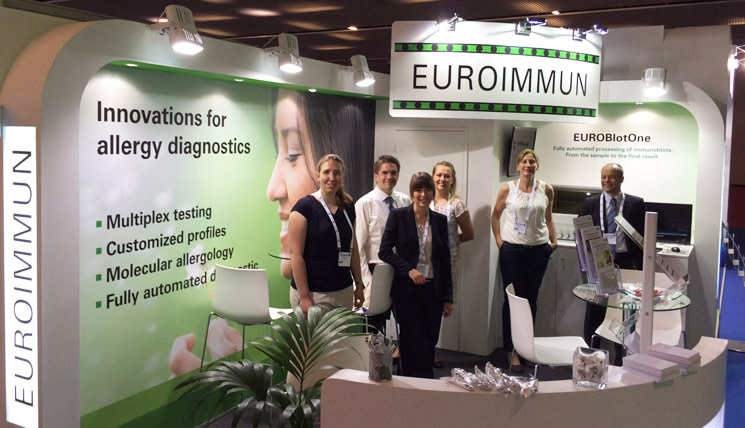More than 7,600 attendees were present at the European Academy of Allergy and Clinical Immunology (EAACI) Congress, which took place in Barcelona at the beginning of June. It is considered the most important allergy congress, being visited by many internationally renowned scientists and offering ample possibilities for a lively exchange of information. This year, EUROIMMUN was present with its own booth and contributed a scientific presentation.
The hot topic at this year’s EAACI were nut allergies. In the session „Food Allergy: Diagnosis“ Johanna van der Valk from Rotterdam presented a clinical study on cashew nut allergy. Beside the typical symptoms such as skin irritation and anaphylaxis, she also described for the first time gastrointestinal complaints. These had not yet been known to occur in connection with nut allergy. Furthermore, an unexpected high number of investigated allergic persons (90%) showed cross reactions to pistachios.
Hugh Sampson, medical scientist at the Mount Sinai Hospital in New York, presented a good deal of new data with respect to cross reactions between different nut sensitisations. He also pointed out that there are regional differences in nut allergy, such as they are known for other allergies. According to Sampson, severe systemic reactions to hazelnut, for instance, are caused by different allergen components of hazelnut in different countries and regions.
At the EUROIMMUN booth the latest product novelties for molecular allergy diagnostics and the EUROBlotOne system for fully automated processing of line blots (EUROLINE) could be viewed. The main centre of attraction were, in particular, the component-resolved profile test systems (defined partial antigen diagnostics, DPA-Dx) for paediatric allergies (milk, egg, peanut). In accordance with the principal topic „nut allergy“, the product announcement for a purely peanut-component based EUROLINE soon to be introduced on the market was met with broad interest. Further profiles for other nut allergies using new allergen components are currently being developed.
Allergies to insect venoms were also among the main topics. Thanks to a cooperation with the work group of Edzard Spillner in Aarhus (Denmark), the University Hospital of Ancona (Italy) and the University Clinic of Freiburg, EUROIMMUN was able to contribute a highly useful scientific presentation to this subject. In a poster presentation, the prototype of a line blot was described that allows differentiation between allergies to cross-reactive insect venoms. The blot contains several recombinant allergen components of vespula and polistes venoms that help to detect specific IgE reactivities. Based on these findings, a product extension for the component-resolved line blot for insect venoms will soon be available.
